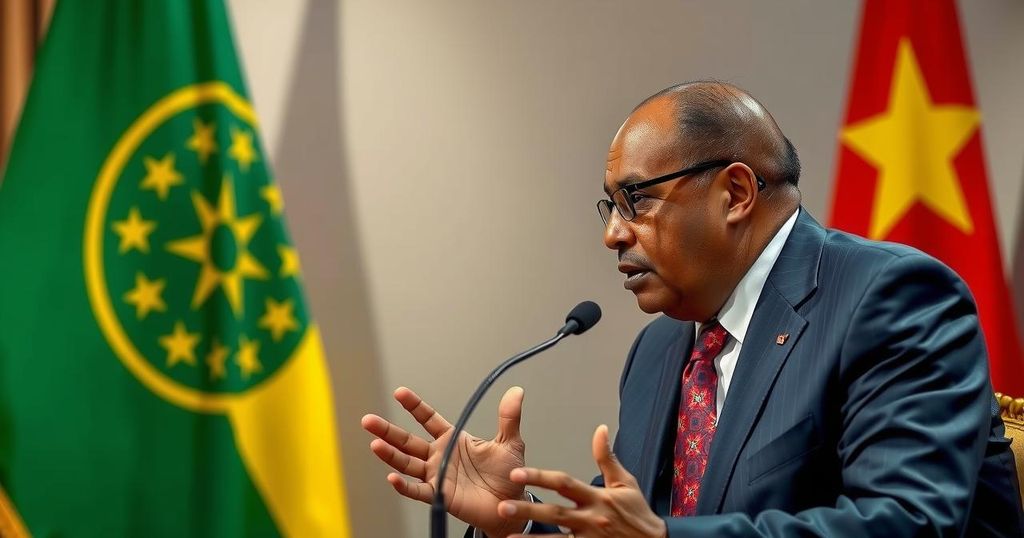Ethiopia’s Territorial Ambitions: Somalia’s President Responds to Land Claims

Somalia’s President Hassan Sheikh Mohamud has accused Ethiopia of attempting to annex further portions of Somali territory, a trend he associates with historical colonial encroachments. He has emphasized recent defense agreements with other nations as strategic moves to counter Ethiopian ambitions. Ethiopian PM Abiy Ahmed has expressed a desire for peaceful solutions regarding access to the Red Sea and clarified that misrepresentations surrounding agreements with Somaliland must be addressed.
Ethiopia’s aspirations to expand its territorial claims over Somalia were at the forefront of discussions recently, with Somali President Hassan Sheikh Mohamud condemning this continued ambition during a speech in the parliament. He emphasized that Ethiopia has a historical pattern of encroaching upon Somali land since colonial times and was now attempting to make further advances contrary to established international laws. The President refrained from specifying the exact areas in contention but reiterated that Ethiopia had annexed portions of Somali territory in the past without facing opposition. President Mohamud articulated that Somalia’s recent defense arrangements with Egypt and Turkey are strategic measures to bolster security and counteract Ethiopian ambitions in the region, following an agreement between Ethiopia and Somaliland that grants Ethiopia access to the Red Sea in exchange for its recognition of Somaliland’s sovereignty. He underscored the incongruity of Ethiopia’s position as both a leading nation of the African Union and a violator of the Union’s principles. Moreover, he dismissed claims implying that the defeat of Al-Shabaab hinges upon the presence of Ethiopian troops, suggesting that Somali forces had successfully reclaimed territories from militant groups without reliance on Ethiopian support. For his part, Ethiopian Prime Minister Abiy Ahmed articulated a commitment to achieving access to the Red Sea through peaceful negotiations and clarified that the recent agreements regarding Somaliland have been misrepresented. He affirmed that Ethiopia had initially suggested a long-term lease of 99 years, which was subsequently reduced to a 50-year term following Somaliland’s requests.
The tensions between Ethiopia and Somalia have historical roots tied to colonial-era boundary lines that have frequently been contested. Ethiopia’s involvement in Somalia typically surfaces during crises involving Somali militant group Al-Shabaab. The African Union Transition Mission in Somalia (ATMIS), with Ethiopian troops as part of its contingent, has been contentious in Somali politics. The emergence of Somaliland as a self-declared independent entity has complicated matters, particularly regarding territorial recognition and international relations in the Horn of Africa. Recent defense agreements signed by Somalia with other nations represent a decisive move in its efforts to establish sovereignty and stability amidst ongoing regional conflicts, particularly those instigated by militant organizations and perceived encroachments by neighboring Ethiopia.
In summary, the issue of land disputes and security in the Horn of Africa continues to evolve, particularly with President Mohamud’s insistence on sovereign rights over Somali territories and the historical grievances with Ethiopia. The Somalia-Egypt-Turkey defense agreements symbolize a proactive approach to safeguarding national interests against perceived threats from Ethiopia, while also calling for a reassessment of Ethiopian military presence in Somalia. As both nations navigate their complex relationship, the resolution of disputes regarding territorial claims and strategic access to vital resources remains crucial for regional stability.
Original Source: www.garoweonline.com








